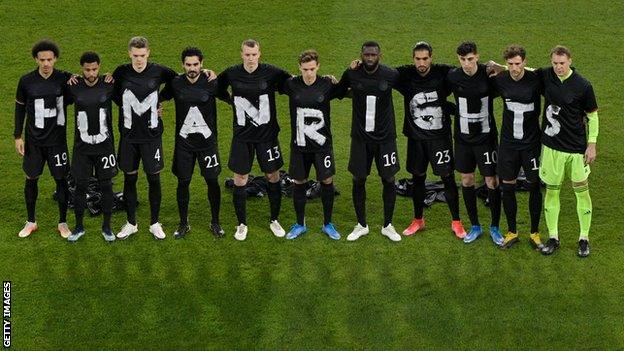2022 World Cup: England players should highlight human rights concerns - Amnesty
- Published

Germany are among teams to have highlighted migrant workers' rights in Qatar
England players, staff and fans should use their positions to highlight human rights concerns in the run-up to the 2022 World Cup in Qatar, according to Amnesty International.
Gareth Southgate's side qualified for the tournament on Monday after beating San Marino 10-0.
But with just over a year until the World Cup kicks off, Amnesty has released a 48-page report claiming migrant workers are being exploited as they help to build stadiums and infrastructure for the winter tournament.
Despite the introduction of what it says are a number of welcome labour reforms since 2017, the human rights organisation claims workers are still "facing wage theft, unsafe working conditions and sometimes insurmountable barriers to changing jobs".
In response, the Qatar government said: "Qatar rejects Amnesty's assertion that labour reforms have not translated into changes on the ground for hundreds of thousands of migrant workers.
"Every year, more companies are held accountable for violating the law. Systemic reform is a long-term process and shifting the behaviour of every company takes time. Through its actions, the government is sending a strong message to companies that violations will not be tolerated.
"Qatar has never shied away from acknowledging that its labour system is still a work in progress."
Speaking after Monday's win, England boss Southgate said: "We will take the time to educate ourselves and if we feel there are areas we can highlight and help, we have always tried to do that and we will do that."
Norway, Netherlands and Germany players have all protested about alleged human rights abuses in Qatar.
"The exploitation of Qatar's massive migrant workforce has already cast a dark shadow over next year's World Cup," said Amnesty International UK's chief executive Sacha Deshmukh.
"The Football Association ought to use the remaining year until kick-off to push for lasting labour reforms in Qatar. It is part of the Uefa Working Group on Workers' Rights in Qatar and can press the Doha authorities over strengthening migrant worker protections, investigating worker deaths and helping to fashion a tournament with a genuinely positive legacy.
"It's more important than ever that England's coaching staff, players and supporters raise human rights issues ahead of next year's kick-off."
The treatment of migrant workers has been highlighted since Qatar was awarded the World Cup in 2010.
A spokesperson for the FA said it was in "regular dialogue" with Amnesty International, world governing body Fifa and other member associations "to ensure that we approach our participation in the upcoming World Cup in a socially responsible manner".
The spokesperson added: "From those discussions to date, we believe there is evidence of substantial progress being made by Qatar in relation to workers' rights. However, we recognise there is still more to be done.
"Our view remains that change is best achieved by working collaboratively with others, while always being mindful that we have our own challenges in this country."
Amnesty's 'Reality Check 2021' report highlights how legal changes were introduced in Qatar in 2017 to improve conditions for hundreds of thousands of workers, who human rights groups say were forced to live in appalling conditions, leading to many deaths.
They included laws which stipulated limits on working hours, committees for settlement disputes, a fund to ensure wages were paid, a new minimum wage, and scrapping rules which meant workers needed to seek their employers' permission to change jobs or leave the country.
But Amnesty says it found that "a failure of implementation means that exploitation continues" and described it as "business as usual" in many respects.
One migrant worker from Kenya told the report: "Change came on paper, but on the ground it has not changed. It is still appalling."
Amnesty also said "authorities have done little to investigate the scale of unexplained deaths" among migrant workers over the past 11 years and prevented them forming or joining trade unions.
It also said Fifa should "use its voice to call on the Qatar government to fulfil its programme of labour reforms before the opening match of the World Cup on 21 November next year".
Last month, Amnesty urged former England captain David Beckham to use his position as a 2022 World Cup ambassador to "keep the world's focus on the human rights issues".
The Qatar government said Amnesty "fails to document a single story" from the hundreds and thousands of workers who have benefited from its reforms.
It added: "Qatar has also strengthened its enforcement measures to safeguard workers and prosecute employers who fail to comply with the law."
"Labour reform is a complex task, and Qatar believes that solutions are best found through dialogue and engagement. For this reason, and despite Amnesty's criticism, Qatar will continue to work constructively with a range of labour experts and practitioners to build on the progress that has been made."
Fifa said in a statement: "The reforms have already benefited hundreds of thousands of workers in Qatar and we need to recognise the significant progress achieved in a very short time, thanks to the commitment of the highest authorities in the country.
"Fifa will continue to push for greater protection of workers and promote the implementation of the wider labour reforms in Qatar through constructive dialogue with the Qatari authorities and joint efforts with other interested stakeholders.
"We are confident the event will leave a lasting legacy and serve as a catalyst for broader positive social change in the host country and across the region."
The local organising committee has also been approached by BBC Sport for a response.